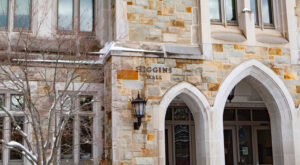Boston College students discussed everything from brain function to the way businesses should operate at the second BC Talks on Tuesday night. The undergraduate lecture series gives students a chance to share their research and interests in 15-minute lectures, similar to the popular TED Talks.
The program was founded in fall 2011 by Lisa Piccirillo, A&S ’13, and Conor Sullivan, LSOE ’13.
“BC Talks provides a forum for students to learn from their peers,” Narintohn Luangrath, director of BC Talks and A&S ’14, said in her introduction.
After going through a rigorous application process in which their proposed talks were reviewed by both students and professors, eleven students got the opportunity to present.
“When I stumbled across the BC Talks website last semester, I thought it was a really cool idea,” Max Ade, founder of Maji Bottles and A&S ’12, said in an e-mail. Ade spoke about his own company and how others, such as Tom’s shoes and SEA hats, are helping create a demand for social responsibility in companies and businesses.
Emilie Josephs, A&S ’13, discussed the important function the brain plays in seeing and the various brain pathologies that have helped scientists better understand this process. Josephs is currently conducting further research on this topic as a research assistant in BC’s Vision and Cognition Lab.
To demonstrate, Josephs showed a very blurred picture of an object, then zoomed out to show that the object was sitting on a bathroom sink. The audience agreed that the object was a hair dryer, but when the same blurred bject was shown in a hardware shop, it appeared to be a drill.
“The only reason it works is because we’re familiar with the context,” Josephs said. “If memory is this important … at what point is vision, vision?”
Iulia Padeanu, A&S ’12, spoke about the Holocaust in Romania, her home country, and the roots of anti-Semitism there. She said that she was inspired to research this subject when she visited Romania and one of her classmates declared that every generation should have a Hitler. She traced anti-Semitism back to Romania’s fear of invasion and loss of territory during World War II and the threat many Jews seemed to pose.
“In order for this chapter to become a reconciliatory chapter, education has to make sure there are no people like my friend who believe in a Hitler every generation,” she said.
Other speakers and their topics were the ways in which social media sites invade privacy, by Courtney Kuhn, A&S ’13; turbidity in the Connecticut River estuary, by Mike Cuttler, A&S ’12; attitudes toward violence in the Middle Ages, by Kevin Hall, A&S ’12, the Kennedy family’s faith and its impact on its members’ political careers, by Elizabeth Wall, A&S ’13; language and mobility in Palestine, by Matt DeMaio, A&S ’13; how the NCAA exploits its players, by Pat Kessock, A&S ’13; the effects of brain cooling, by Kyle Marra, A&S ’12, and the cost and future of U.S. relations with China, by Sam Shriver, A&S ’14.



